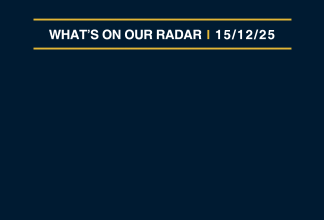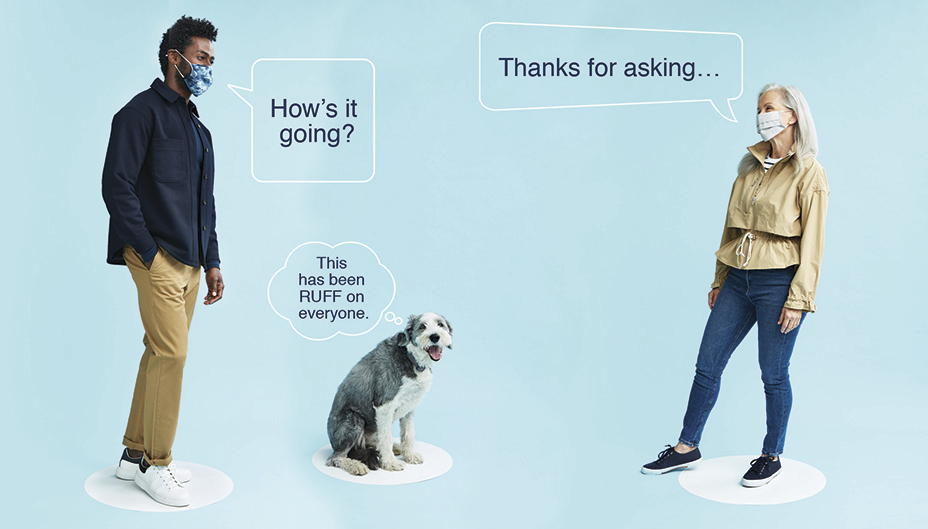Approved COVID-Speak: What (and What Not) to Say
Written by Sylvia Stewart
Published on October 15, 2020
minute read
Share:
Good news for the socially anxious, but bad news for everyone else: Thanks to the strange new normal brought on by COVID-19, we're all a little socially awkward these days. It can be hard to know what — or what not — to say anymore. Plus, our collective experience of the pandemic has been described as a type of grief, so the stakes of saying the right thing are higher than before.
To help us all keep our feet out of our mouths, we asked the experts what to do. Here, a psychologist explains why your usual banter likely needs work, and an etiquette expert offers more appropriate alternatives.

DON'T: Ignore COVID altogether
In pandemic times, many of our go-to greetings — like "Hope you've had a great summer!" or "Hope this email finds you well" — can sound less friendly, even like an affront. It's human nature to catastrophize, or assume the worst, during a crisis, says Dr. Theo De Gagne, a psychologist in Vancouver . "People can look at that in a negative way and say, 'I did not have a good summer. It was terrible." The best approach? Can the canned messaging.

DO: Acknowledge the moment
For cold emails or anyone you don't know personally, Toronto-based etiquette expert Lisa Orr has the easiest fix: "My intro has changed from 'Hope this email finds you well' to 'Hope this email finds you well during these challenging times,'" she says. Even if you say nothing else about COVID, those four little words can do the job.

DON'T: Make assumptions
A seemingly innocuous "Stay safe and healthy!" sign-off, for example, is full of assumptions. "Some people don't feel safe or healthy," says Orr. Maybe the recipient of your message is caring for an ill grandparent or has a loved one who's a front-line worker. Likewise, "Are your kids complaining about wearing masks in class too?" is a very loaded question. If you don't know a person well enough to ask for details, skip any and all assumptions entirely.

DO: Listen instead
This was true pre-COVID and it's especially true now: "You don't know anyone's emotional state," explains Dr. De Gagne. The person could be sick, sad or grieving, and the last thing you want to do is accidentally make them feel worse. The easiest way to avoid this? Ask questions instead of making assertions. You can't go wrong with "How are you holding up?" and then listening.
It's okay to ask your brother about his investment portfolio (even though the markets have been volatile).

DON'T: Avoid weighty topics
"Money and finances have always been taboo — even before this crisis — and a lot of people aren't doing well right now," says Orr. Now more than ever, we need to ask each other the potentially uncomfortable questions, provided we're willing to listen and be supportive. It's okay to ask your friend about her job (even if she's likely been let go); it's okay to ask your brother about his investment portfolio (even though the markets have been volatile). If you want to ask someone about their work, says Dr. De Gagne, do it, and be authentic and compassionate in your response.

DO: Open a dialogue
The tactful way to deepen your COVID conversations is to share your own experiences to open the door to dialogue. Be prepared for tough topics. "Sometimes people just need to vent and your job is to listen," says Orr. You should also reply, of course — even if it's just "I'm sorry to hear that," make sure you acknowledge their feelings and respond sensitively.

DON'T: Forget to reach out often
Technology enables us to stay in touch in spite of social distancing limitations — but some of us are reluctant to connect. "If you have the bandwidth to reach out and listen, you should," says Dr. De Gagne. A simple "just thinking of you" check-in, which doesn't necessitate a response, can work wonders in maintaining relationships with colleagues and friends. Meanwhile, if you need a sympathetic ear, it's perfectly okay to reach out and ask someone to lend one.

DO: Respect the usual workplace boundaries (and some new ones)
Yes, many people are perpetually at home and on their laptops, but no, that doesn't mean their availability has changed to full time or all-hours. All the rules of respecting time and space — plus some new ones (like never surprise-Zoom) — still apply, though Orr suggests offering people more deadline wiggle room than before. Try not to judge co-workers who need more flexibility than you do, she adds. "We're all doing our best right now," says Orr.
RBC Direct Investing Inc. and Royal Bank of Canada are separate corporate entities which are affiliated. RBC Direct Investing Inc. is a wholly owned subsidiary of Royal Bank of Canada and is a Member of the Investment Industry Regulatory Organization of Canada and the Canadian Investor Protection Fund. Royal Bank of Canada and certain of its issuers are related to RBC Direct Investing Inc. RBC Direct Investing Inc. does not provide investment advice or recommendations regarding the purchase or sale of any securities. Investors are responsible for their own investment decisions. RBC Direct Investing is a business name used by RBC Direct Investing Inc. ® / ™ Trademark(s) of Royal Bank of Canada. RBC and Royal Bank are registered trademarks of Royal Bank of Canada. Used under licence
© Royal Bank of Canada 2020.
The views and opinions expressed in this publication are for your general interest and do not necessarily reflect the views and opinions of RBC Direct Investing. Furthermore, the products, services and securities referred to in this publication are only available in Canada and other jurisdictions where they may be legally offered for sale. If you are not currently resident of Canada, you should not access the information available on the RBC Direct Investing website.
Explore More

7 Ways to Get Ahead Financially in 2026
How you might invigorate your finances and put your money to work more intentionally this year
minute read

Economic Outlook: Uncertainty is Here to Stay, So What's Next?
Takeaways from the Economic Club of Canada’s Annual Event
minute read

3 things: Week of December 15
What the Inspired Investor team is watching this week
minute read
Inspired Investor brings you personal stories, timely information and expert insights to empower your investment decisions. Visit About Us to find out more.







